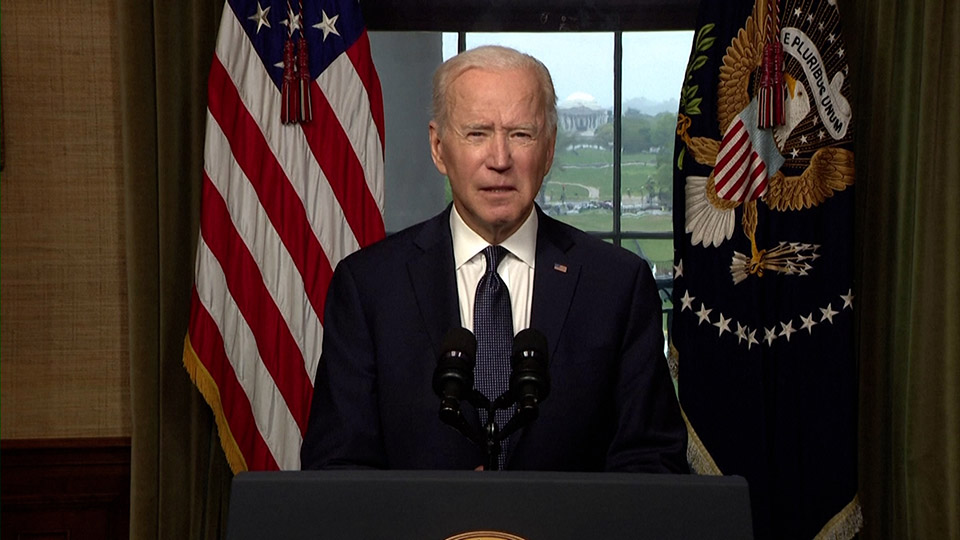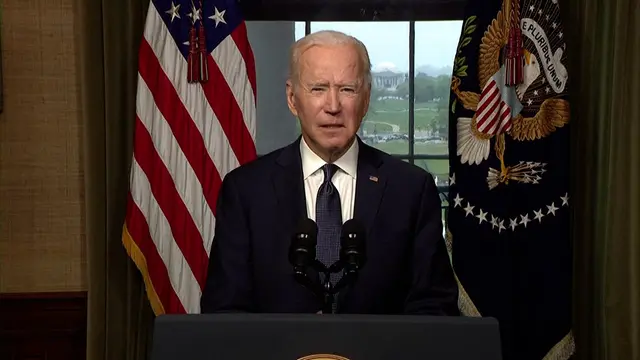00:53

U.S. President Joe Biden announced on Wednesday plans to withdraw all U.S. combat troops from Afghanistan by September 11.
"It is time to end America's longest war," Biden said, but he emphasized that the U.S. will "not conduct a hasty rush to the exit."
The move coincides with the 20th anniversary of the terror attacks in the U.S.. Some 2,500 troops remain in Afghanistan.
The White House said the U.S. will continue to provide development, humanitarian and security assistance to the Afghan people, continue to support peace talks between the Afghan government and the Taliban, and continue to help train Afghan military.
"The Islamic Republic of Afghanistan respects the U.S. decision, and we will work with our U.S. partners to ensure a smooth transition," Afghanistan President Ashraf Ghani tweeted.
Former U.S. President Barack Obama supported Biden's decision, saying in a statement that "It is time to recognize that we have accomplished all that we can militarily, and that it's time to bring our remaining troops home."
Over the past 20 years, about 800,000 U.S. troops have been deployed to Afghanistan. More than 2,300 American soldiers died in the conflict and some 20,000 were wounded. The cost of the war and related reconstruction expenses amounted to about $2 trillion.
But Biden's decision received criticism mostly from Republicans. "This is a reckless and dangerous decision," said Senator Jim Inhofe of Oklahoma, "Arbitrary deadlines would likely put our troops in danger, jeopardize all the progress we've made, and lead to civil war in Afghanistan — and create a breeding ground for international terrorists."
Senate Republican leader Mitch McConnell also expressed concerned the decision will "abandon U.S. efforts in Afghanistan which have helped keep radical Islamic terrorism in check."
The U.S. intelligence officials believe that Al Qaeda or other terrorist groups will not pose any immediate threat to U.S. security, and if necessary, the U.S. and its allies can quickly rebuild its anti-terrorism efforts in Afghanistan to respond to any future threats.
The war started in 2001 when former President George W. Bush ordered American forces to invade Afghanistan to defeat Osama bin Laden and Al Qaeda after the September 11 attacks.
The war was widely supported by the international community, but as the war evolved and expanded to nation-building, democratization and fighting for women's rights, it became harder to secure sustainable success.
Afghan people fear that Al Qaeda will bounce back after the U.S. troops' withdrawal.
"I am so worried about my future. It seems so murky. If the Taliban take over, I lose my identity," said Wahida Sadeqi, 17, an 11th grader at Pardis High School in Kabul. "It is about my existence. It is not about their withdrawal. I was born in 2004 and I have no idea what the Taliban did to women, but I know women were banned from everything."
Check out
The China Report
, our new weekly newsletter.Subscribe here!
 简体中文
简体中文

